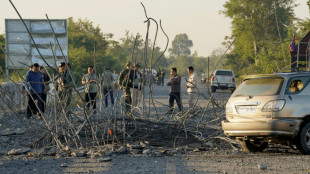
-
 Steelers receiver Metcalf strikes Lions fan
Steelers receiver Metcalf strikes Lions fan
-
Morocco coach 'taking no risks' with Hakimi fitness

-
 Gang members given hundreds-years-long sentences in El Salvador
Gang members given hundreds-years-long sentences in El Salvador
-
Chargers, Bills edge closer to playoff berths

-
 Gang members given hundred-years-long sentences in El Salvador
Gang members given hundred-years-long sentences in El Salvador
-
Hosts Morocco off to winning start at Africa Cup of Nations

-
 No jacket required for Emery as Villa dream of title glory
No jacket required for Emery as Villa dream of title glory
-
Amorim fears United captain Fernandes will be out 'a while'

-
 Nigerian government frees 130 kidnapped Catholic schoolchildren
Nigerian government frees 130 kidnapped Catholic schoolchildren
-
Captain Kane helps undermanned Bayern go nine clear in Bundesliga

-
 Captain Kane helps undermanned Bayern go nine clear
Captain Kane helps undermanned Bayern go nine clear
-
Rogers stars as Villa beat Man Utd to boost title bid

-
 Barca strengthen Liga lead at Villarreal, Atletico go third
Barca strengthen Liga lead at Villarreal, Atletico go third
-
Third 'Avatar' film soars to top in N. American box office debut

-
 Third day of Ukraine settlement talks to begin in Miami
Third day of Ukraine settlement talks to begin in Miami
-
Barcelona's Raphinha, Yamal strike in Villarreal win

-
 Macron, on UAE visit, announces new French aircraft carrier
Macron, on UAE visit, announces new French aircraft carrier
-
Barca's Raphinha, Yamal strike in Villarreal win

-
 Gunmen kill 9, wound 10 in South Africa bar attack
Gunmen kill 9, wound 10 in South Africa bar attack
-
Allegations of new cover-up over Epstein files

-
 Atletico go third with comfortable win at Girona
Atletico go third with comfortable win at Girona
-
Schwarz breaks World Cup duck with Alta Badia giant slalom victory

-
 Salah unaffected by Liverpool turmoil ahead of AFCON opener - Egypt coach
Salah unaffected by Liverpool turmoil ahead of AFCON opener - Egypt coach
-
Goggia eases her pain with World Cup super-G win as Vonn takes third

-
 Goggia wins World Cup super-G as Vonn takes third
Goggia wins World Cup super-G as Vonn takes third
-
Cambodia says Thai border clashes displace over half a million

-
 Kremlin denies three-way US-Ukraine-Russia talks in preparation
Kremlin denies three-way US-Ukraine-Russia talks in preparation
-
Williamson says 'series by series' call on New Zealand Test future

-
 Taiwan police rule out 'terrorism' in metro stabbing
Taiwan police rule out 'terrorism' in metro stabbing
-
Australia falls silent, lights candles for Bondi Beach shooting victims

-
 DR Congo's amputees bear scars of years of conflict
DR Congo's amputees bear scars of years of conflict
-
Venison butts beef off menus at UK venues

-
 Cummins, Lyon doubts for Melbourne after 'hugely satsfying' Ashes
Cummins, Lyon doubts for Melbourne after 'hugely satsfying' Ashes
-
'It sucks': Stokes vows England will bounce back after losing Ashes

-
 Australia probes security services after Bondi Beach attack
Australia probes security services after Bondi Beach attack
-
West Indies need 462 to win after Conway's historic century

-
 Thai border clashes displace over half a million in Cambodia
Thai border clashes displace over half a million in Cambodia
-
Australia beat England by 82 runs to win third Test and retain Ashes

-
 China's rare earths El Dorado gives strategic edge
China's rare earths El Dorado gives strategic edge
-
Japan footballer 'King Kazu' to play on at the age of 58

-
 New Zealand's Conway joins elite club with century, double ton in same Test
New Zealand's Conway joins elite club with century, double ton in same Test
-
Australian PM orders police, intelligence review after Bondi attack

-
 Durant shines as Rockets avenge Nuggets loss
Durant shines as Rockets avenge Nuggets loss
-
Pressure on Morocco to deliver as Africa Cup of Nations kicks off

-
 Australia remove Smith as England still need 126 to keep Ashes alive
Australia remove Smith as England still need 126 to keep Ashes alive
-
Myanmar mystics divine future after ill-augured election

-
 From the Andes to Darfur: Colombians lured to Sudan's killing fields
From the Andes to Darfur: Colombians lured to Sudan's killing fields
-
Eagles win division as Commanders clash descends into brawl

-
 US again seizes oil tanker off coast of Venezuela
US again seizes oil tanker off coast of Venezuela
-
New Zealand 35-0, lead by 190, after racing through West Indies tail


Has there finally been progress in treating schizophrenia?
For decades there has been almost no improvement in the medical treatment of schizophrenia, one of the most serious and devastating of all mental illnesses, but recent advances have raised hopes of progress.
The condition often only hits the headlines after violent attacks by sufferers, such as a schizophrenic patient who stabbed a nurse to death last week in the French city of Reims.
But French psychiatrist Sonia Dollfus emphasised that such cases of violence by people with schizophrenia are "extremely rare".
"All the work done over the years trying to de-stigmatise this disease -- it is swept away in 24 hours," Dollfus told AFP.
Around one in every 300 people worldwide are affected by schizophrenia, according to the World Health Organization.
It causes a wide range of distressing delusional disorders, which vary in intensity between patients but often hugely disrupts their lives.
At least five percent of schizophrenia patients are estimated to die by suicide.
The condition is usually treated with a combination of anti-psychotic drugs, social support for reintegration, and psychological therapy.
Scottish psychiatrist Robin Murray, who has spent decades researching schizophrenia, told AFP that when it came to medication, "treatment has not changed dramatically" over the last 20 or 30 years.
He added that psychological therapy had improved in that time.
But unlike numerous other mental disorders -- particularly neurotic conditions -- taking serious drugs remains the cornerstone in treating schizophrenia.
- Innovation -
For drugs, there has been a "blank period since the 2010s, when pharmaceutical laboratories really withdrew from psychiatry," Dollfus said.
But there has been some innovation recently, she added.
One development have been apps that can track patients' progress, ensure timely follow-up sessions and contact psychiatrists if necessary.
Another is a new treatment approved by the US Food and Drug Administration last month.
The treatment, developed by the Israeli pharmaceutical firm Teva and France's MedinCell, involves the drug risperidone which has long been used for schizophrenia.
It has traditionally been prescribed as a daily pill, but the new treatment is administered via injection, allowing the drug to be gradually released in the body over several weeks.
This makes it impossible for patients to miss a daily pill.
Interruptions to medication, often brought about by the psychosis the illness causes, are a common problem in treating schizophrenia.
For example, the attacker in Reims had been off his medication, according to several sources.
- 'Really promising' -
This new way of administering an old medication is not the kind of revolution that a new drug would represent. But progress may soon be made in that area.
Dollfus said that some drugs currently being investigated are "really interesting" because they work in a different way than those of the past.
Traditionally, anti-psychotic drugs used to treat schizophrenia aim to block the action of dopamine, a molecule that acts as a chemical messenger in the brain.
However, dopamine seems to play a complex role in schizophrenia -- some patients can have excessive levels in some respects and insufficient levels in others.
Traditional anti-psychotic drugs, which tend to work well at stopping certain symptoms such as hallucinations, do not help in other areas, such as the loss of willpower or struggles with language and speech.
Recent research has focused on finding other molecules which regulate rather than block dopamine, while also acting on other areas thought to be involved in schizophrenia.
These treatments, such as one that targets a protein called TAAR1, are still some way away from being available to patients.
But the TAAR1 drug has had positive results from the most advanced stage of trials, known as phase 3.
"This is a really promising avenue," Dollfus said.
M.Fischer--AMWN



